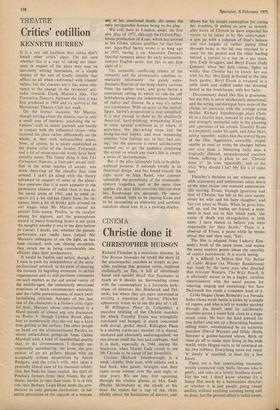THEATRE
Critics' cotillion
KENNETH HURREN
It is a coy old tradition that critics don't knock other critics' plays. I'm not sure whether this is a way of taking out insur- ance in respect of the plays they may be nervously writing themselves, or a simple display of the sort of kindly timidity that afflicts us all when confronted with friends' babies, but the chances are it has some rele- vance to the change in the reviewers' atti- tudes towards Frank Marcus's play, The Formation Dancers, between the time it was first produced in 1964 and its revival at the Hampstead Theatre Club last week.
On the former occasion, Mr Marcus, though writing about the theatre, was in only a small way of business, practising the re- viewers' craft in minor journals and hardly in contact with the influential chaps—who received his piece rather offhandedly on the whole; at best with well-qualified praise. Now, of course, he is nicely established as the drama critic of the Sunday Telegraph, and a lot of seven-year-old words have been amiably eaten. The funny thing is that The Formation Dancers, a four-part sexual cotil- lion in the artier reaches of society, was more deserving of the plaudits first time around. I can'•t go along with the theory advanced in support of some of the a•bout- face opinions that it is more apposite to the permissive climate of today than it was to the social scene of 1964, and in some re- spects it's a bit old-hat (there have, for in- stance, been a lot of kooky girls around on our stages since Mr Marcus created his amoral little scamp, Perdita, as the catalyst among his pigeons; and the gramophone record of heavy-breathing lovers is not quite the naughty novelty it was in the days before Je raime). I doubt, too, whether the present performers can really have helped Mr Marcus's colleagues to see the light, as has been claimed; with one shining exception, they struck me as being considerably less efficient than their predecessors.
It would be foolish and unfair, though, if I were to push my independence of the intra- professional network to the point of denying the comedy its beguiling moments, its skilful organisation and its still-pertinent comments on such matters as the sad sexual vanity of the middle-aged, the melancholy emotional emptiness of much contemporary amorality, and the risible pretentiousness of much intel- lectualising criticism. Apropos of this last, one of the characters is a literary critic (tact- ful man, Marcus) whose conversation is a bland parody of almost any arts discussion on Radio 3—though Lyndon Brook plays him so ponderously that the wit has a hard time getting to the surface. The other people on hand are the aforementioned Perdita, to whose unfastidious goings-on Anna Calder Marshall adds a kind of neanderthal quality that, in the circumstances, I thought un- reasonably unendearing; her lover, the pro- prietor of an art gallery, played with an acceptably urbane desperation by Anton Rodgers; and the critic's wife, who takes a generally liberal view of his incessant infidel- ities, but finds his latest exploit, the theft of Perdita's favours from their friend, the art dealer, harder to take than most. It is in this role that Barbara Leigh-Hunt lends the pro- duction its only genuine distinction: in her subtle perception of the anguish of a woman out of her emotional depth, she seems the only recognisable human being in the play. We still, here in London, await the first new play of 1971, although the Oxford Play- house production of Kean, which has arrived at the Globe, almost qualifies for that hon- our. Jean-Paul Sartre wrote it as long ago as 1953, basing it on Alexandre Dumas's fanciful romance about the early-nineteenth- century English actor, but this is our first sight of it.
The ostensibly conflicting talents of the romantic and the existentialist combine re- markably felicitously: the gaudy melo- dramatic flourish of the thing clearly survives from the earlier work, and gives Sartre a convenient setting in which to ride his old hobbyhorse about the indeterminate borders of reality and illusion. In a way it's rather too convenient. With an actor as the central figure, Sartre's proposition is over-simplified. It is easy enough to show us the ebulliently theatrical, hard-drinking, womanising Kean in some natural confusion as to where, if anywhere, the play-acting stops and the living-for-real begins, and even wondering whether 'true feelings are, in fact, bad act- ing,' but the question is never satisfactorily opened out to get the audience pondering the extent to which any man's life is simply a series of 'performances.'
But if the play ultimately fails in its philo- sophical purpose, it succeeds vividly in its theatrical design, and has found exactly the right actor in Alan Badel, who conveys splendidly the grandiosity of the nineteenth- century tragedian, and at the same time applies the neat little restraints that our own less flamboyant era demands. He seems often; indeed, both to be playing Kean and to be recounting an elaborate and sardonic anecdote about him. It is a riveting display.


































 Previous page
Previous page